I . Survey
(i) Geographic Location
Located in the center of Bohai-Rim, backed by the vast area of north China and facing north-east Asia, Tianjin, also called “Jin” for short, is an important hub for connections to more than ten provinces and cities in north China. Tianjin is only 120 kilometers away from Beijing, the capital city of China. With the Haihe River, one of the five largest rivers in China, crossing from north to south, Tianjin has long been renowned as“Sea Inlet of Nine Rivers” and“ Communications Center of River and Sea”.
Located in the east eight time zone, Tianjin is geographically located between Latitude 38o34' and 45o15'N and Longitude 116o43' and 118o04'E. Tianjin has a total area of more than 11,800 square kilometers, with 153 km coastline and over 1,100 km land boundary.
(ii) Climate
Tianjian has a semi-humid continental monsoon climate of warm-temperate zone with four distinct seasons and adequate sunshine. It has cold winters and hot summers while spring and autumn are short and pleasant. The annual average temperature stands at around 12℃ . In General, January is the coldest month and July is the hottest. The average frost free season lasts about 200 days; and annual average rainfall is about 600 mm.
(iii) Population and Nationalities
The resident population of Tianjin was 10.42 million in 2005, which included non-agricultural population of 5.624 million and agricultural population of 3.7691 million, accounting for 60% and 40% of total population respectively. Most of residents in Tianjin are Han nationalities and other residents are from 51 minor nationalities like Hui, Man, Mongolia, Korea, Zhuang, Tujia, Miao and Tibet.
(iv) Infrastructures and Transportation
As the sea port for vast areas in north and northwest China and also the east starting point of Eurasia Continental Bridge with the shortest distance inside China, Tianjin enjoys obvious transportation advantages and has established a wellorganized sea, land and air transportation system.
Airport and Port
Tianjin Binhai International Airport is the largest cargo air transportation center in north China and has 65 domestic and international flight courses to 54 cities. In 2005, the cargo and passenger throughput of the airport reached 80,000 metric tons and 1.65 million respectively.
Tianjin is the largest port in north China and ranks among 10 largest ports in the world. In 2005, its cargo throughput reached 240 million metric tons, which include 4.80 million standard containers. Having business relations with over 300 ports in 160 countries and regions around the world, Tianjin has over 70 container liners and has established sister port relationship with 12 ports from 10 countries, namely, Kobe Port and Tokyo Port of Japan, Melbourne Port of Australia, Philadelphia Port and Port of Tacoma of USA, Montreal Port of Canada, Amsterdam Port of Holland, Trieste Port of Italy, Marseille Port of France, Inchon Port of Korea, Barcelona Port of Spain and Bruges Port of Belgium.
Road
In 2005, total length of roads in Tianjin reached 10,836 kilometers, which include expressways of 593 kilometers. Cargoes and passengers carried total 198.50 million metric tons and 29.61 million respectively. A number of highways inside urban area connect with various expressways like Beijing-Shanghai Expressway, Beijing-Shenyang Expressway and Tianjin-Tangshan Expressway.
Railway
As the hub of Northeast China, North China, East China and South China regions, a number of high-speed railways including Beijing-Harbin Railway, Beijing-Shanghai Railway and Beijing-Jiulong Railway pass through Tianjin. In 2005, railway cargo and passenger transportation in Tianjin reached 72.41 million metric tons and 15.5 million respectively.
Finance and Insurance
By the end of 2005, there are 2,926 financial institutions in Tianjin with a total asset of RMB 753.36 billion yuan, which include 17 wholly foreign-owned banks. And there are 427 insurance agencies of various levels with the total assets of 25.15 billion yuan and total premium income of 9.064 billion yuan.
List of Chinese Financial Institutions
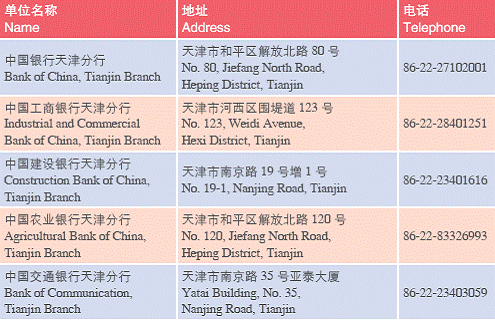
List of Foreign Financial Institutions
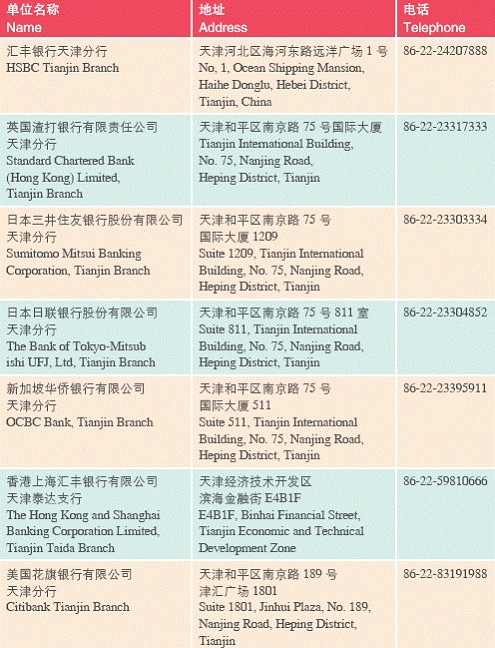
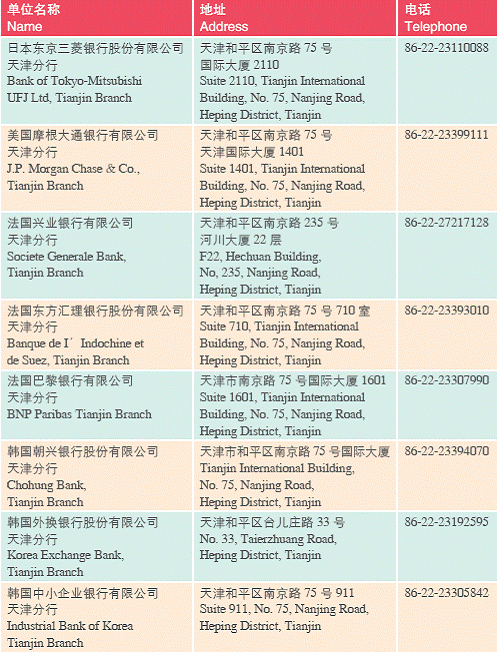
Telecommunication and Internet
In 2005, the total revenue of postal and telecommunication services in Tianjin reached RMB 17.6 billion yuan, total volume of regional telephone switchboards totaled 629 and the subscribers of fixed telephone and mobile phone were 4.37 million and 5.03 million respectively. With a long-distance optical fi ber cable link of 3,013 kilometers, 4.5 billion short messages being sent and Internet users of 2.07 million, Tianjin takes a lead in the development of information industry in China. A high-speed broadband network environment supported by lightguide fiber network and supplemented by wireless network covering all over Tianjin has been established.
(v) Foreign Exchanges
International Sister Cities
By the end of 2005, Tianjin had entered into agreement on sister city relationship, exchange and cooperation with 57 cities (provinces, states and regions) from 38 countries. Among them, 23 are sister cities of Tianjin and 34 have established friendly cooperative relationship with Tianjin.
List of International Sister Cities of Tianjin

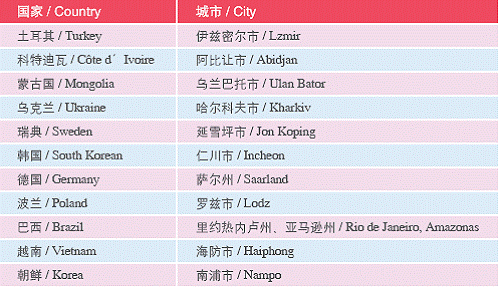
Convention and Exhibition
In 2005, with an accumulative total of 7,755 booths, the contracted value of RMB 13.058 billion yuan and 890,000 visitors, 18 large exhibitions and trade fairs were held in Tianjin. Tianjin Spring National Commodities Fair is held in April every year; North China International Bicycle Exhibition is held in the first half of each year, International Fair on Accessory for Manufacturing Industry (Mobile) and Global Purchase is held in the second half of each year; PECC International Trade & Investment Fair is held once every two years and Tianjin Beer Festival is held in July and August each year. All these have become the exhibition brands of Tianjin.
(vi) Senior Education and Scientifi c Research
Located in the center of the talentintensive areas surrounding Bohai Sea, Tianjin has rich human resources. Up to 2005, Tianjin has 42 colleges, universities and higher vocational schools with 332,000 students at the year end including 29,000 postgraduates.
In 2005, there are 425,000 specialized technical personnel in Tianjin, which includes 27 academicians (12 academicians from Chinese Academy of Sciences and 15 from Chinese Academy of Engineering), 126 postdoctoral stations with more than 500 post doctors. Tens of state-level engineering research centers, statelevel and ministerial level technical testing centers have been established in Tianjin. In 2005, Tianjin won 14 National Science & Technology Awards, which include 2 Second Prize of National Natural Science Award, 1 Second Prize of National Technology Invention Award and 11 Second Prize of Science & Technology Progress Award. Tianjin has main-tained the third place in China in overall science and technology progress.
(vii) Tourism
Tianjin has developed a well-organized tourism pattern, which takes Haihe River as the axial line, downtown area as the main body, and Jixian County and Binhai New Area as its two wings. Various tourist routes like water travel, travel to the former residence of celebrities, famous street travel, Outing to Yuyang, Xiqing Folk Custom Travel and Travel to Binhai New Area have been launched. In addition, a series of large tourism events were also held on annual basis, like folk custom temple fair (during Spring Festival), Peach Blossom Cultural and Travel Festival on the Great Canal (in March), Huangyaguan Great Wall International Marathon Event (in May), European Charm Festival (in June), Tianjin-Tanggu Sea Travel (in July), Tianjin Mazu Cultural and Travel Festival (in September),Yuyang Autumn Travel Festival, Gulou International Folk Custom Travel Festival (in October), Haihe River Travel Festival and International College Students Dragon Boat Competition.
In 2005, 740,000 foreign tourists visited Tianjin and spent US$ 510 million in Tianjin.
Famous Scenic Sites
Renowned as the “Ferry of the Emperor” and seated on the seashore with a landscape of mountains and lakes, Tianjin has rich tourism resources and enjoys the fame as“ the epitome of modern China”. Its famous sites mainly includes: Panshan Mountain in Jixian County -“ Back Yard Garden” of Tianjin and Beijing with a green sightseeing site surrounded by famous mountains, quiet forests, clean water, impregnable passes and old temples; Folk Custom Residences like the famous house in Jinmen-Shi Family Mansion, Former Residence of Huo Yuanjia- the famous martial art master, Tianjin Mazu Templeone of the three largest Mazu temples in China and Yangliuqing New Year Picture Museum; Former Residence of Celebrities including former residences of Sun Yatsen, Zhang Xueliang, Liang Qichao, Pu Yi (the last emperor), 7 presidents and 5 prime ministers of the late Qing Dynasty and the early Republic of China and Hoover- the former president of the United States; Historical Building of Various Countries ( Tianjin is known as the“ Museum of Buildings of Various Countries”, there are large number of buildings of different styles on the five main roads and d o w n t o w n a r e a n e a r Haihe River); Seaside S i g h t l i k e b e a c h e s , harbor , forts , retired aircraft carrier, Haimen Old Temple, Haihe Beach Park and Imported Goods Market; Wetland and Lakes like Qilihai Lake of Ninghe County, Tuanbowa Lake of Jinghai County, and Dongli Lake of Dongli District.
Featured Commodities
Tianjin has four world-known folk arts including“ Zhang's Art of Clay”, “Yangliuqing New Year Pictures”,“ Wei's Kites”(which won golden prize in World's Panama Exposition in 1914) and“ Liu's Brick Sculpture”. In addition, Tianjin's folk arts are also renowned for its Tianjin paper cutting, Tianjin Lantern, Tianjin Velvet Silk Flower and various international and domestical award-winning carpets and tapestries.
Special Food
Tianjin has also a variety of traditional style foods , in which ,“Three Unique Foods of Tianjin” are comprised of Goubuli's Stuffed Buns, Guifaxiang Fried Dough Twists and Ear-Hole Fried Cake. Other special foods include: Zhang's Peanut K e r n e l , Cao's Donkey Meat, Lu's Fried Cake, Bai's Dumplings, Zhilanzhai Sweetened Rice Flour, Dafulai's crispy rice with vegetables and Stone Doorsill Steamed Stuffed Buns.
II . Economy
(i) GDP Data
In 2005, GDP of Tianjin reached 369.762 billion yuan, with per capita GDP of US$ 4,322. The proportions of the primary, secondary and tertiary industries were 3 percent, 55 percent and 42 percent respectively.
Growth of GDP from 2000 to 2005 in Tianjin
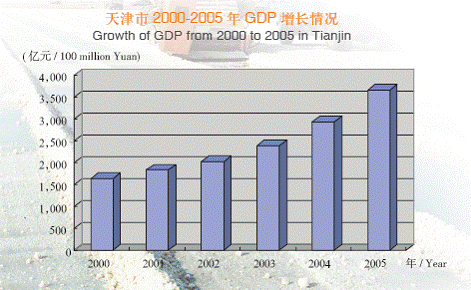
(ii) Resources, Agriculture and Industry
Natural Resources
As an industrial and commercial metropolis, Tianjin has a highly-developed economic level, as well as the prominent advantage in natural resources. The first are the rich resources of oil and natural gas. Bohai Oil Field and Dagang Oil Field both serve as priority oil and natural gas fi elds in China, which produced 17.83 million tons of crude oil and 880 million cubic meters of natural gas in 2005. The second are rich sea salt resources. With a coastline of 153 km long, Tianjin has the most famous sea salt producing area in China- Changlu Saltern, with the annual production of 2.3 million tons of crude salt, occupying 10 percent of the total of China. The third are abundant metal and nonmetal mineral resources. There are more than 10 different kinds of metal mineral resources in Tianjin like chambersite, manganese, gold, tungsten, molybdenum, copper, zinc and iron and various nonmetal mineral resources including cement limestone, barite, stromatolite, marble, natural stone, violet sand clay soil, Maifan Stone, etc. The fourth are plentiful geothermal resources. The geothermal resources in Tianjin are characterized by shallow deposit place and fine water quality with the total geothermal water reserves of 110.36 billion cubic meters. This geothermal source is the largest medium-and-low temperature geothermal field ever discovered in China. The fifth are mass coastal beach lands. Tianjin covers an area of 1,191,900 hectares in total, including 138,000 hectares of unused land. In the coastal region along the lower reaches of Haihe River, there is a piece of 1,214 square km of saline-alkali soil to be developed. With the convenience in transportation and low expense in development, there is much room for this piece of land to be used for ecology preservation and construction.
In addition, Tianjin has great water resources. This city is located in the lower reaches of Haihe River, where its five great tributaries, South Canal, North Canal, Ziyahe River, Daqinghe River and Yongdinghe River converge and fl ow into the sea. 19 first-class river courses pass by Tianjin, totaling 1,095 km long, and so do 79 secondclass river courses with a total of 1,363 km long. There are 1,061 deep aqueducts with the total length of 4,578 km. The complete systems of fl ooding prevention, drainage,irrigation and power generation have been constructed.
Industry
Tianjin is the cradle of China's modern mechanic industry and textile industry, and many products and original inventions in many industries in China first came into being in Tianjin, such as mailing, bicycle, watch, television set, camera, etc. After years of development, Tianjin is no longer dependent solely on traditional industries for growth; instead, it is adopting a new industrial pattern that depends on backbone industries and new & hi-tech industries, gradually forming six dominant industries namely electronic information, automobile , metallurgy , chemical, biotechnology & modern medicine, and new e n e r g y & e n v i r o n m e n t a l protection. In 2005, Tianjin achieved the gross industrial output of 716.96 billion yuan, among which, the weight of the six dominant industries in the city's all industries was 72%, and that of new & hi-tech industry was 32%. The manufacturing industry of electronic information products has become the first dominant industry in Tianjin.
Proportions of Three Industries

Major Industrial Product Output in 2005
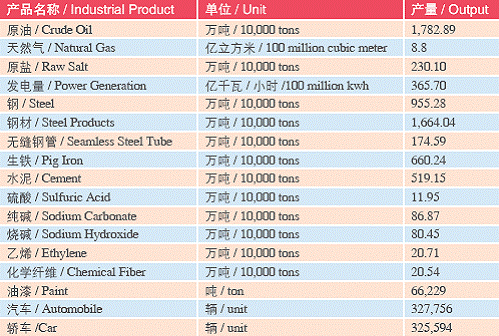
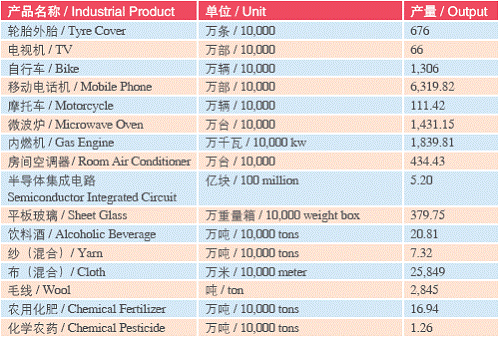
Proportions of 6 Dominant Industries
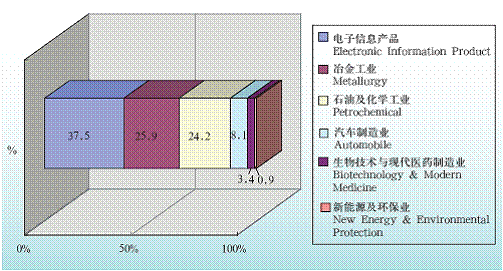
Service Industry
In 2005, the service sector (the tertiary industry) in Tianjin realized the added value of 153.41 billion yuan, including 22.7 billion yuan in transportation, warehousing and post sector with the proportion of 15%, 43.6 billion yuan in wholesale and retail sector with the proportion of 28%, 7 billion yuan in accommodation and food service sector with the proportion of 5%, 15.9 billion yuan in financial sector with the proportion of 10%, and 12.9 billion yuan in real estate sector with the proportion of 13%.
Agriculture
In 2005, Tianjin achieved the gross agricultural output value of 23.834 billion yuan, with the agricultural structure being deepened and the construction of agricultural gardens and infrastructure signifi cantly being enhanced. The proportion of aquaculture in the gross agricultural output value reached 58 percent, economic crops occupies 57% in the total crops planting area, and 70% of farmers have realized agricultural industrialization.
Tianjin is rich in many famous agricultural products and by-products with outstanding quality, including the traditional export commodities such as Xiaozhan Rice (local rice in Tianjin) and red beans, the four famous vegetables in Tianjin, i.e. Shawo green turnips, Qingmaye Chinese cabbages, onions with yellow cover and leeks with big green sprouts, Tianjin Chinese chestnuts, Tianjin pears and muscat grapes under the brand of“ Cha Dian”, which are all well known to both China and foreign countries. Tianjin yields over 150 varieties of famous aquatic products, such as cutlass fi sh, prawn, purple crabs, and icefish (Salangidae). What is more, the cucumber planting technology studied out by Tianjin Agricultural Research Institute gains a good reputation.
Output of Major Agriculture Products in 2005
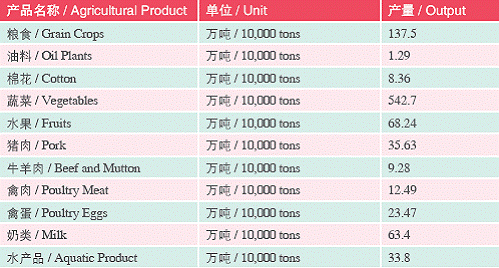
(iii) Commercial Data
Import and Export
In 2005, the total import and export volume in Tianjin was US$ 53.387 billion, among which the total export was US$ 27.415 billion. The gross export volume of common trade amounted to US$ 9.083 billion, taking 33.1% of the total export volume in Tianjin; and the gross volume of processing trade was US$ 16.754 billion, occupying 61.1%. The structure of export commodities has been further optimized; the export volume of electromechanical products ranked fourth in China, which was US$ 18.5 billion, occupying 67.5% of the total export volume, and the export volume of hi-tech products reached US$ 12.47 billion, occupying 45.5% of the total export volume in Tianjin. The commodities with large export volume include mobile phones and relevant components and parts, electrical appliances and electronic products, computers, motors and electric generators, etc.


Geographical Distribution of Export Market Shares in 2005

Growth Rate of Export Trade from 2000-2005

Comparison Between Tianjin's Foreign Trade and GDP

Utilization of Foreign Investment
In 2005, there were 1,309 projects with direct foreign investment in Tianjin. The accumulative utilization of direct foreign investment reached US$ 7.323 billion, and the actual utilization of such investment was US$ 3.329 billion. In the same year, there were 379 newly approved projects whose foreign investment exceeded US$ 5 million.
By 2005 end , foreign - invested enterprises with approval certificates have accumulated to 18,401, contracted foreign investment totaled US$ 58.213 billion, and actualized foreign investment reached US$ 0.341 billion. Businessmen from 110 countries and regions have invested in Tianjin. In order of contracted foreign investment volume, the top 10 countries and regions are Hong Kong, America, Japan, Virgin Island, South Korea, European Union, Taiwan , Singapore ,Cayman Island, and Australia. Among top 500 multinationals, 114 have established foreigninvested enterprises like Motorola, Samsung, Toyota, LG, Semiconductor Manufacturing International, Novo Nordisk, Rohm, Nestle, Kumho Tire, Tinghsin Group, etc. Most foreign investment goes to manufacturing projects, which accounts for 63.77% of the total actualized foreign investment, followed by the 33.88% of investment in tertiary industry.
In 2005, foreign-invested enterprises in Tianjin realized US$ 394.729 billion sales revenue, US$ 22.022 billion export, US$ 25.775 billion profit, and US$19.022 billion tax. Favorable ROI and business opportunities have driven foreign-invested enterprises to make more investment and issue more stocks.
Countries and Regions Whose Investment in Tianjin Ranked Top Ten from 2000-2005
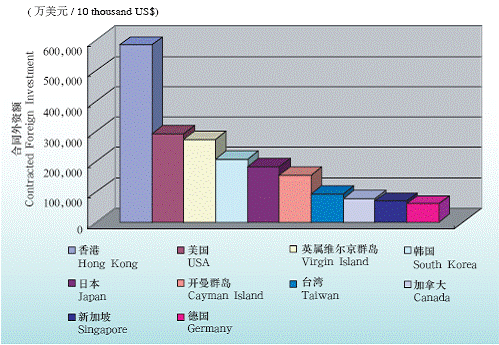
Major Industries Actually Used Foreign Investment in 2005
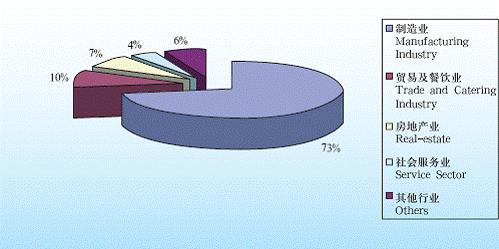
Economic Cooperation with Foreign Partners and Technology Introduction
In 2005, 907 contracts of foreign contracted projects, design, consulting and labor services were signed, with the contract volume of US$ 432 million and the turnover of US$ 320 million; 13,100 people were sent abroad to provide labor services by year end; 75 new enterprises were established overseas (including 54 manufacturing enterprises) with the total investment of US$ 50.4883 million, among which US$ 43.7154 million was invested by the Chinese side. The main fields of investment cover chemical industry, pharmacy, building materials, food, garment, etc.
By the end of 2005, the accumulated value of contracts of foreign contracted projects , labor services , design and consultation amounts to US$ 3.716 billion, and the real turnover is US$ 3.271 billion; a total of 79,813 people were sent abroad to provide labor services. In total, 617 enterprises were approved to be established overseas with the total investment of US$ 497 million, among which US$ 361 million was invested by the Chinese side, occupying 72.6% of the total investment. The foreign contracted project business of Tianjin covers 88 countries and regions. Now, 49 enterprises in Tianjin have gained the qualification for contracted projects with foreign countries and 7 enterprises have gained the qualification for labor services cooperation with foreign countries in such sectors as construction, water conservancy, electricity, transportation, petrochemical industry, and offshore petroleum. 13 enterprises are qualified to take charge of foreign aid tasks including 4 for Foreign Aid Engineering and 9 for foreign aid materials. In 2005, Tianjin continued to introduce advanced technologies from foreign countries and regions. During the whole year, 580 contracts for technology import were signed, with the contracted value of US$ 657 million.
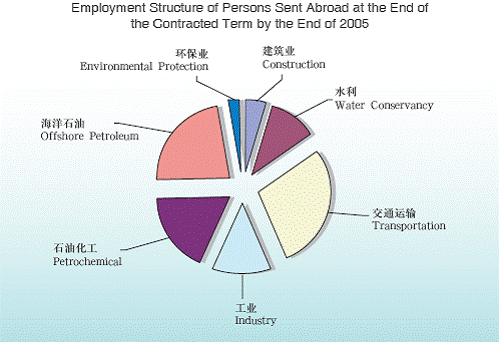
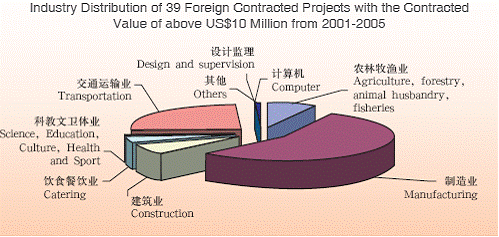
Trade Circulation
In 2005, commodities purchased and sold in Tianjin totaled 844 billion yuan; total retail sales of social consumer goods reached 119 billion yuan; trade circulation realized increment of 48.863 billion yuan, which accounted for 13.3% of Tianjin GDP, and contributed 32.5% of the tertiary industry, the highest among all lines in the tertiary industry. Consumption in sectors such as residential house, automobile, communication, tourism, and restaurants has been growing rapidly, becoming new consumption hot spots.
Up to 2005, there are 297 trading facilities, each of which covers an area of at least 5,000m2 and 57 large-scale wholesale markets with the turnover above 100 million yuan respectively. Modern circulation represented by chain operation, logistics and e-commerce is booming, and various advanced circulation operational and management skills have been applied and promoted. The conference and exhibition economy is also flourishing with nearly 1,000 various trade shows, exhibitions and conferences held within a year. All of these have further enhanced the prosperity of the metropolis of Tianjin.
Added Value in Commerce from 2000-2005

III . Investment
(i)Policy and Administrative Rules
Catalogue of Related Laws
Foreign Trade Law of the People's Republic of China
Customs Law of the People's Republic of China
Law of the People's Republic of China on Import and Export Commodity Inspection
Law of the People's Republic of China on Chinese-Foreign Equity Joint Ventures
Law of the People's Republic of China on Chinese-Foreign Contractual Joint Ventures
Law of the People's Republic of China on Foreign-Capital Enterprises
Company Law of the People's Republic of China
Law of the People's Republic of China on the Entry and Exit Animal and Plant Quarantine
Law of the People's Republic of China on Control of the Entry and Exit of Aliens
Law of the People's Republic of China on the Control of the Exit and Entry of Citizens
Securities Law of the People's Republic of China
Income Tax Law of the People's Republic of China for Enterprises with Foreign Investment and Foreign Enterprises
Individual Income Tax Law of the People's Republic of China
Law of the People's Republic of China on the Administration of Tax Collection
Environmental Protection Law of the People's Republic of China
Law of the People's Republic of China on Evaluation of Environmental Effects
Law of the People's Republic of China on Promotion of Cleaner Production
Law of the People's Republic of China on Prevention and Control of Desertifi cation
Marine Environment Protection Law of the People's Republic of China
Law of the People's Republic of China on the Prevention and Control of Atmospheric Pollution
Law of the People's Republic of China on Prevention and Control of Environmental Pollution by Solid Waste
Law of the People's Republic of China on Prevention and Control of Water Pollution
Law of the People's Republic of China on Prevention and Control of Environmental Noise Pollution
Law of the People's Republic of China on Prevention and Control of Radioactive Pollution
Frontier Health and Quarantine Law of the People's Republic of China
Labour Law of the People's Republic of China
Trade Union Law of the People's Republic of China
Searching Website for the Related Laws
1 . Searching System of Laws and Regulations of China (website of National People's Congress of China)
http://law.npc.gov.cn:87/home/begin1.cbs
2. China Legislative Information Network System
http://www.chinalaw.gov.cn/jsp/jalor/index.jsp
3. Ministry of Commerce
http://www.mofcom.gov.cn
The above-mentioned websites are for reference only.
(ii) Catalogue of Encouraged Foreign Investment Industries of Tianjin
1. Electronic information industry: wireless communication, new type of components and devices, computer peripheral equipment, software, IC, digital audio-video devices, optical communication products and auto electronics.
2. Automobile industry: environmental-friendly economic car, medium and high-grade car, light car, parlor car, car engine and automobile parts.
3. Chemical industry: petrochemical industry, ocean chemical industry, C 1 chemical industry, comprehensive energy utilization and recycle industry; plastics, fiber, rubber and fine chemical products; and chlor-alkali chemical products.
4. Metallurgical industry: Top quality steel products and high-grade metal products.
5. Biochemical technology and modern pharmaceutical industry: modern Chinese traditional medicine, pharmaceutical chemicals and bioengineering pharmaceuticals.
6. New energy and environmental protection industry: low power and dynamic lithiumion cell, Ni-MH and fuel cell, battery materials; OPTO-mechatronics battery equipment; sewage water treatment, recycle, regeneration and utilization equipment; atmospheric pollution disposal technologies and complete equipment; new environmental protection materials, waste disposal facilities and resource utilization equipment.
7. Equipment manufacturing industry, shipbuilding and airport equipment manufacturing.
8. High and new technology industry.
9. Textile products, garment, light industrial and consumer products, modern foods, home appliances, bicycles, card-making and anti-fake printing, and precision instrument.
10. Modern service industries: international trade, modern logistics, tourism, regional financial services, information and technology services, trade, intermediary services, cultural services, community services and real estate.
(iii) Procedures for Enterprise Establishment
Basic procedures
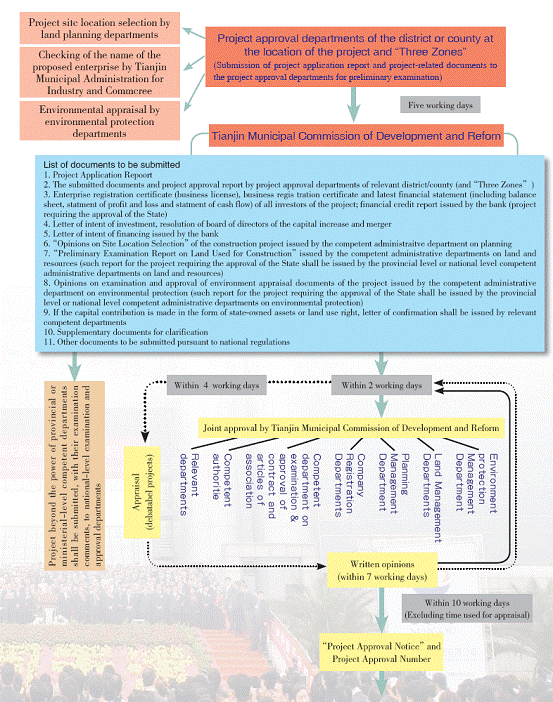
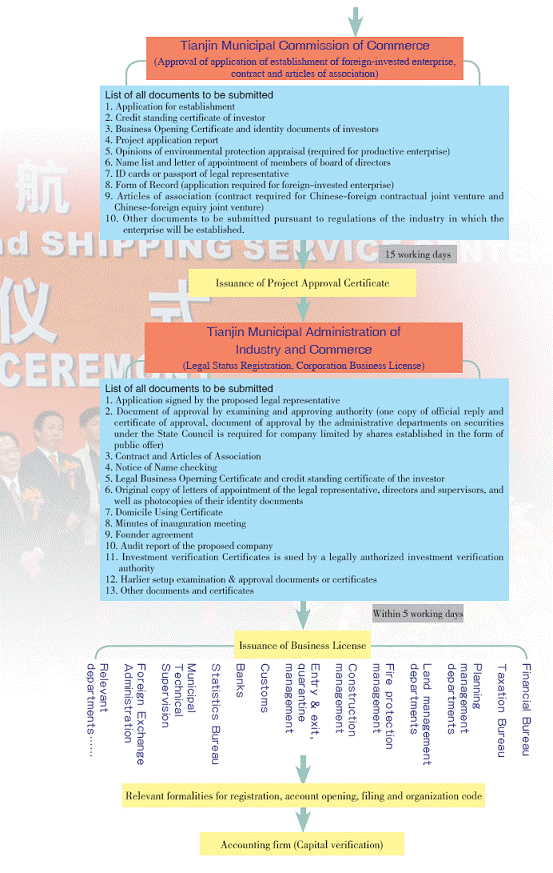
Procedures for Multinational Corporations (MNCs) to Establish Regional Headquarters in Tianjin
1. All MNCs meeting the following criteria are permitted to establish regional headquarters in Tianjin:
(1) Companies that have total assets of no less than US$400 million and have already established a foreign-invested enterprise (or foreign-invested enterprises) in China and paid a registered capital of no less than US$10 million; or with a good credit, established more than 5 foreign-invested enterprises in China with a paid-in registered capital of no less than US$ 50 million.
(2) Companies that have already established a solely foreign invested investment company or a solely foreign invested management service limited company with a registered capital of no less than US$2 million, and are applying for making the investment company or management service limited company their regional headquarters.
2. To establish regional headquarters in Tianjin, MNCs shall make applications to Tianjin Municipal Commission of Commerce and submit the following documents:
(1) Application for Establishing Regional Headquarters signed by the legal representative of the investment company or management service limited company, which is authorized by the MNC to be the regional headquarters;
(2) Authorization document signed by the legal representative of the MNC regarding the establishment of the regional headquarters and the functions thereof;
(3) Credit standing certificate, registration documents (copies) of the MNC and legal representative certifi cate (copy);
(4) Approval certificate and business license (copies) of the foreign-invested enterprise(s) of the MNC;
(5) Authorization letter signed by the legal representative of the MNC and granted to the proposed legal representative of the proposed regional headquarters; curriculum vitae and corresponding identification documents of the proposed legal representative;
(6) Other documents as required by laws and regulations; Unless stipulated otherwise, all the above documents shall be provided in their originals. Tianjin Municipal Commission of Commerce shall decide within 30 days upon the reception of the complete application documents whether to approve or not the application. A letter of approval shall be issued if the Commission approves.
(iv) Residential Environment
Living Environment
Tianjin is a city both old and young with great convergence and strong affinity from the historical and modern point of views. In 2005, Tianjin made great success in establishing the national exemplary city of environmental protection with a green coverage rate of 36.4%, 8.4 square meters per capita public green land in urban areas and the percentage of days in which the air quality is good of 81.6%. The rates of water quality up to standard are both 100 percent for drinking water sources and urban water function zones.
Medical Service
In Tianjin, there are 2,489 various medical and public health organizations, including 461 hospitals and health centers, 42,000 sickbeds and 61,300 medical staff. Meanwhile, there is a complete public health system, covering disease prevention and cure centers and 120 emergency centers . It holds a lead i n g position in many medical fields such as cardiovascular and cerebrovascular diseases, liver transplant, metabolic diseases, gynecology and obstetrics, skin diseases, stomatology, eye, ear, nose and throat, and prevention and cure of epidemic diseases.
Culture and Sports
A public cultural service system has come into being on the whole to adapt to a modern metropolis. In Tianjin, there are 19 cultural centers and science and technology museums, 18 various museums, and 32 public libraries. Its per capita space and quality of cultural facilities in urban area are both listed in the top in China. There are programs in English in both radio and TV broadcasting. Large-scale international sports games are often held in Tianjin.
Work and Residence Permit
In accordance with the Law of the People's Republic of China on Control of the Entry and Exit of Aliens and its Rules for Implementation, visas shall be marked with different Chinese phonetic letters and issued to different aliens according to their stated purposes of visit to China, i.e. (L) indicating tourist visa, (F) indicating visitor visa, (G) indicating transit visa, (C) indicating crew visa, (D) indicating settlement visa, (Z) indicating employment visa, (X) indicating student visa, (J-1) indicating resident foreign correspondents in China, and (J-2) indicating foreign correspondents who make short trip to China on reporting tasks. Those aliens who hold visas marked by (D), (Z), (X) and (J-1) and stay in China for a period of 6 months to 1 year shall apply for Aliens' Temporary Residence Cards, and those who stay in China for 1 year or more shall apply for Aliens' Residence Cards. When applying for a residence card, a person shall submit for examination his or her passport and visa, as well as papers supporting the application for residence. Whoever applies for Aliens' Residence Cards shall also submit for examination his or her health certificate and two recently-taken 2-inch half-length, bareheaded, full-faced photos. As for the citizens from those countries that have signed visa-exemption agreement with Chinese government, if they stay in China for no more than 30 days, they may be exempted from Aliens' Residence Cards, and if they stay in China for 30 days or more, they shall apply for Aliens' Temporary Residence Cards or Aliens' Residence Cards to the Administration Division of Entry and Exit.
Driving License
Following are the specific procedures for aliens holding driving license of foreign countries, Hong Kong or Taiwan Province or international driving license to change for Chinese Driving License:
1. Complete an Application Form for Driving License; 2. Submit for examination the residence card (as to applying for Driving License, the residence period shall be 1 year or more, and as to applying for Temporary Driving License, the residence period shall be between 3 months and 1 year); 3. Submit for examination the original copy, duplicate copy and translated copy in Chinese of the foreign Driving License; 4. Submit for examination the passport; 5. Vehicles Administration Office will issue Driving License to those conforming to stipulations and passing examinations; 6. The report form for passing the examination (as to those having a practical driving experience of no more than 3 years, on-road driving test is required) is required; 7. One 1-inch chromatic bareheaded photo is required.
(v) Reference Prices of Basic Elements
Charge for Water Supply Unit: Yuan/ Cubic Meter

Note: The charge for water for residents includes 0.8 yuan sewage treatment expense and the charge for other types of water includes 1.1 yuan sewage treatment expense.
List of Electricity Prices of Tianjin Electricity Network Unit: Yuan/KWh
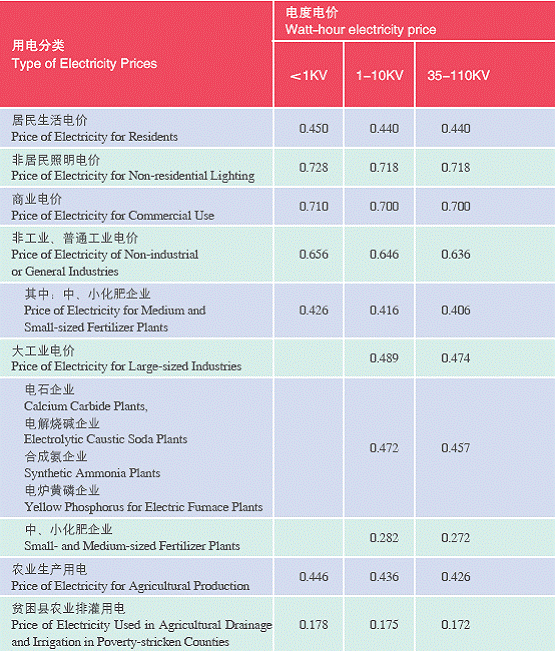
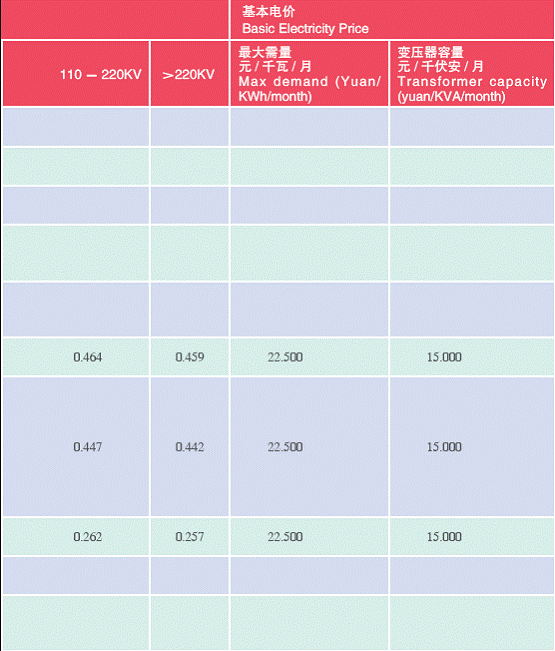
Gas Price for Commercial and Industry Use Unit: Yuan/ Cubic Meter

Thermal Supply for Commercial and Industrial Use

Standard Land Price in Central Tianjin Unit: Yuan/ Square meter
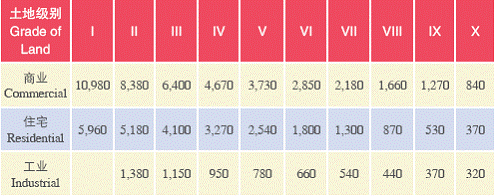
Note: Land prices of the development zones of Tianjin are determined by the development zones subject to the type of use of the land and the investment coverage.
Standard of Land Use Price for Foreign-Invested Enterprises in Tianjin
Unit: Yuan / Year/ Square meter

Rates for the Basic Pension, Medical and Unemployment Insurance of Employees
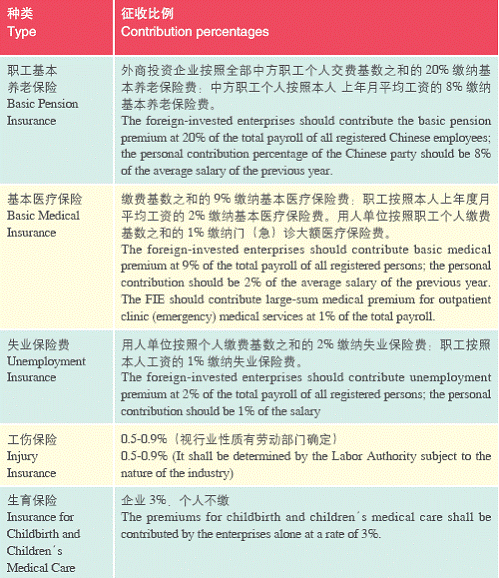
Other Expenses
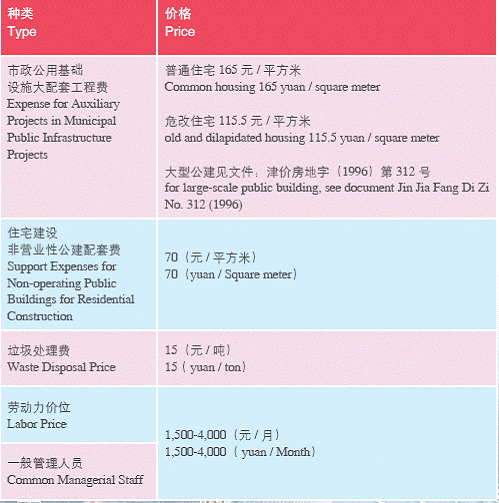
IV. Development Zones
(i) Development Areas
Binhai New Area (BNA)
In the Eleventh Five-Year Plan , BNA is incorporated into the national development strategy, together with Shenzhen of Guangdong province and Pudong of Shanghai municipality, becoming another important growth point of driving regional economic development. Located in the coastal area in the east of Tianjin, BNA is composed of three function zones including Tianjin Port, Tianjin Economic-Technological Development Area (TEDA), Tianjin Free Trade Zone, three administrative areas namely Tanggu, Hangu and Dagang District as well as part of Dongli District and Jinnan District. It covers an area of 2,270 km2 with a coastline of 153 kilometers.
In accordance with the Opinion on Relevant Issues on the Promotion of Development of Tianjin BNA promulgated by the State Council of the People's Republic of China, Tianjin BNA is positioned to become a high-level base of modern manufacturing and commercialization of research findings, international aviation center of North China and a new ecological city with prosperous economy, harmonious society and beautiful environment by utilizing the various resources of Beijing, Tianjin and Hebei Province, providing the services to Bohai-Rim region and promoting the development of North-east China, North China and North-west China.
Tianjin BNA has been approved as the comprehensive reform experimental zone by the State Council, where some important reform and opening measures in land management, financial innovations, free trade zone, and support for the development of high-tech enterprises will be tried out in advance.
In 2005, the GDP of Tianjin BNA was 160.863 billion yuan, occupying 44% of that of the whole city; the gross foreign export value was US$18.47 billion, occupying 67.4% of the total of the city.
Tianjin Economic-Technological Development Area (TEDA)
Tianjin Economic-Technological Development Area (TEDA) was set up in December 1984. Through over 20 years of development, it has accumulated higher degree of industry connection and higher competitiveness, occupying a leading position in comprehensive strength among the development areas nationwide. In 2000, TEDA was acclaimed by Fortune Magazine of the US as“ the most admirable industrial park of China”. In 2002, United Nations Industrial Development Organization (UNIDO) listed TEDA as one of the most dynamic areas of China together with other 5 cities and regions including Shenzhen, Suzhou, Shanghai Pudong, etc.
In 2005, TEDA's GDP totaled 64.229 billion yuan, the accumulative utilization of direct foreign investment reached US$2.595 billion, the actual utilization of foreign investment reached US$1.285 billion, and the export was 13.971 billion yuan, up 25% as compared with last year. By 2005 end, TEDA has approved 4,067 foreign-invested enterprises from 74 countries and regions including Hong Kong, Taiwan and Macau with an investment volume of US$29.043 billion. World top multinationals like Motorola, Toyota Automobile, Glaxo Smith Kline and Samsung have established enterprises here.
Tianjin Free Trade Zone (TFTZ)
Tianjin Free Trade Zone (TFTZ) in BNA was founded with approval from the State Council on May 12, 1991. It is the largest free trade zone in the north of China with four major functions including international trade, modern logistics, port processing, and commodity exhibition. TFTZ enjoys privileged policies on customs, tax and foreign exchange. Since its inception more than a decade ago, TFTZ has maintained continuous, healthy and rapid economic growth. Now TFTZ has formed three dominant industries including international trade , modern logistics, and export processing and a new pattern featuring co-development of seaport free trade zone, airport logistics processing zone and airport international logistics.
By 2005 end, TFTZ has attracted US$10.7 billion foreign direct investment (FDI) with actualized amount totaling US$5 billion. Over 5,700 enterprises from 133 countries and regions have invested in the Zone, 56 of which are Fortune 500 companies. Over 200 transnational logistics companies, e.g., Singapore YCH, Germany Volkswagen, Benz, Switzerland Prestige and Japan Toyota Tsusho, have established regional logistics centers in TFTZ, distributing over 2,000 kinds of products. Import & export trading centers have been set up for cars & auto parts, electronic components, petroleum chemical, engineering mechanics, steel products, cotton, fruits, and lumber, etc., forming an international multi-level and multi-polarization logistics system characterized by third party domination. It is developing as the bellwether and driving force for the economic development in Beijing-Tianjin Metropolis Economic Circle, Bohai-Rim region and northern China as a whole.
Tianjin Hi-Tech Industry Park (THIP)
Tianjin Hi-Tech Industry Park (THIP), the important source and carrier for the city's pursuit of scientific and technological progress, was approved by the State Council as a state-level hi-tech zone in March 1991. While actively developing new & hi-tech industries with self-owned IPR, THIP aims to build itself as the city's largest-scale and most-advanced hi-tech industry base that has critical status and influence in China. In 2005, THIP became China's first approved “National Intellectual Property Trial Park” among all hi-tech zones in China. In the same year, 392 technology contracts were verified and registered with a contract volume of 350 million yuan. In 2005, the total technology, industry and trade income in this park reached 75.129 billion yuan and
the foreign exchange through exports totaled US$2.453 billion.
List of Tianjin' s Development Areas
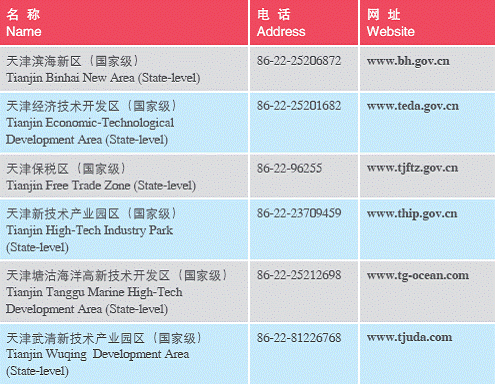
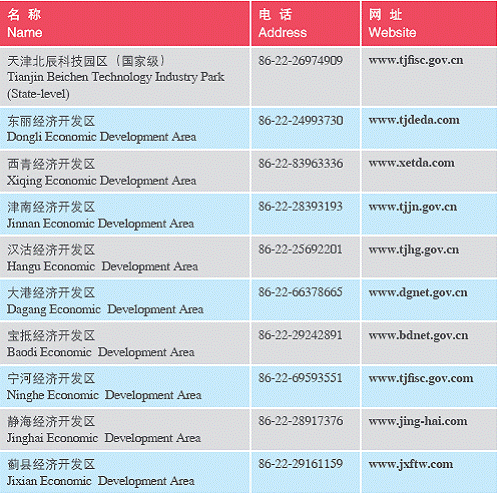
(ii) Relevant Institutions
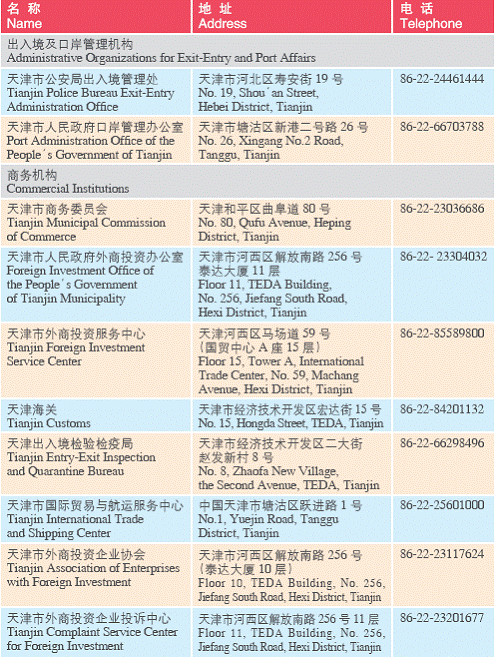
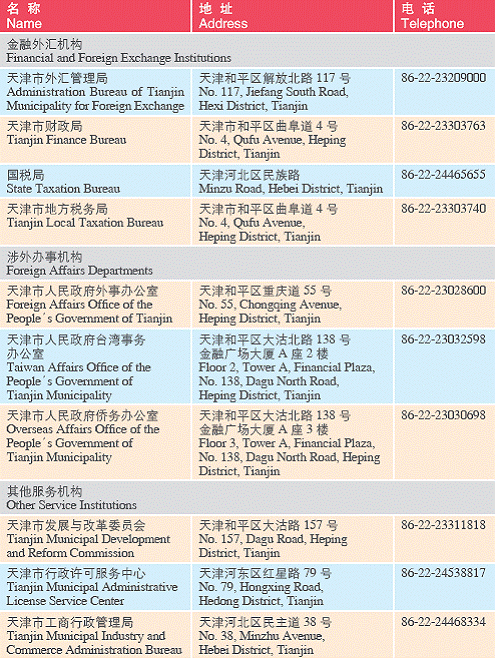
Relevant Websites
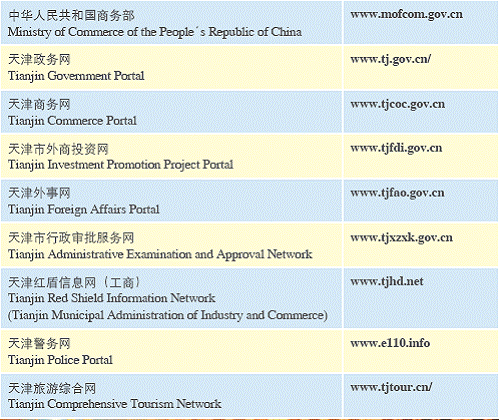
Appendix
Regulations for the Administration of Tianjin Binhai New Area ( For details,please visit www.bh.gov.cn)
Regulations for the Administration of Tianjin Economic-Technological Development Area (For details,please visit www.teda.gov.cn)
Regulations for the Administration of Tianjin Free Trade Zone (For details,please visit www.tjftz.gov.cn )
Regulations for the Administration of Tianjin High-Tech Industry Park (For details,please visit www.thip.gov.cn)
Regulations of Tianjin on Labor Management of Foreign-Funded Companies (For details,please visit www.tjfdi.gov.cn)
Administrative Measures of Tianjin International Trade and Shipping Center (For details,please visit www.tjitsc.gov.cn)
Measures of Tianjin for the Administration of Administrative Examination and Approval (For details,please visit www.tjxzxk.gov.cn)
Emergency / Inquiry Telephone Numbers
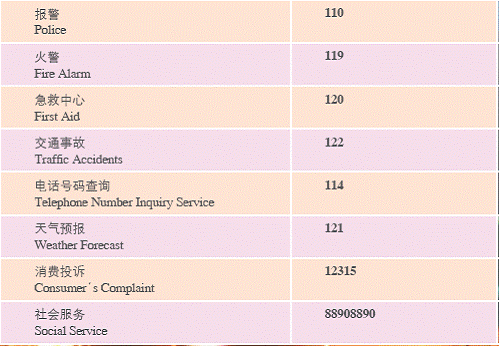
List of Four-star Hotels and Above
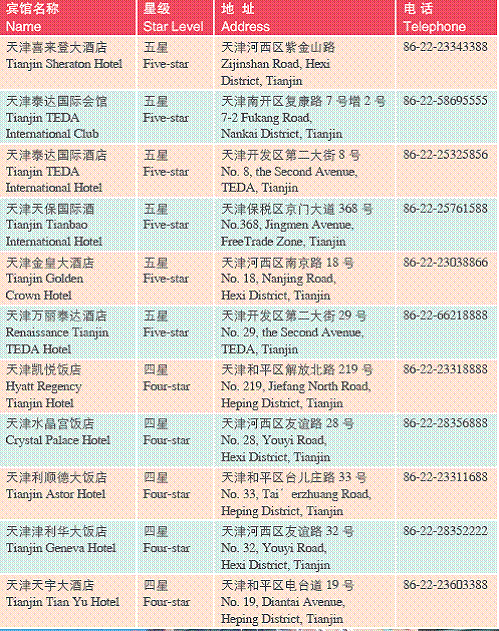
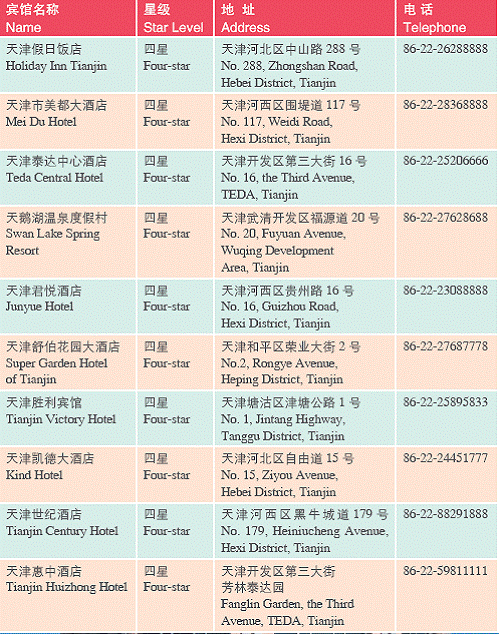
(Ministry of Commerce)